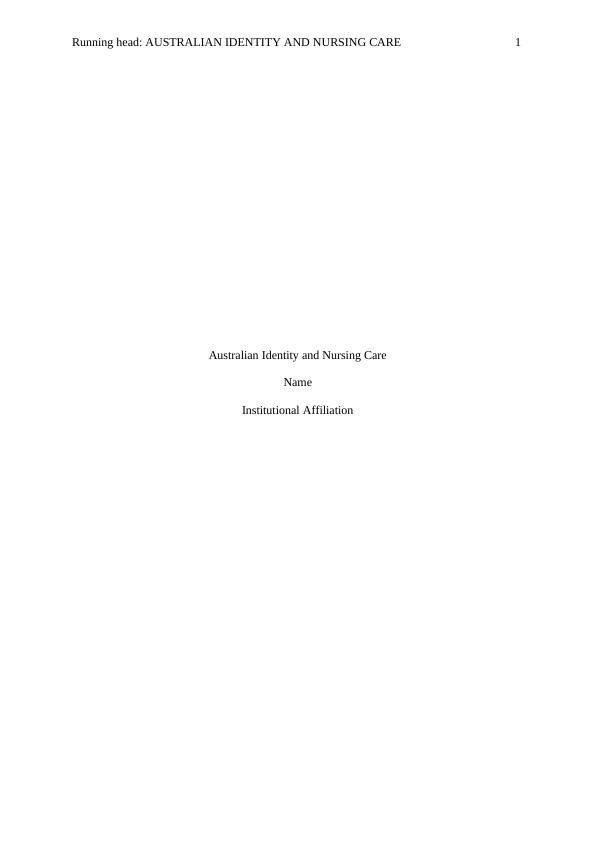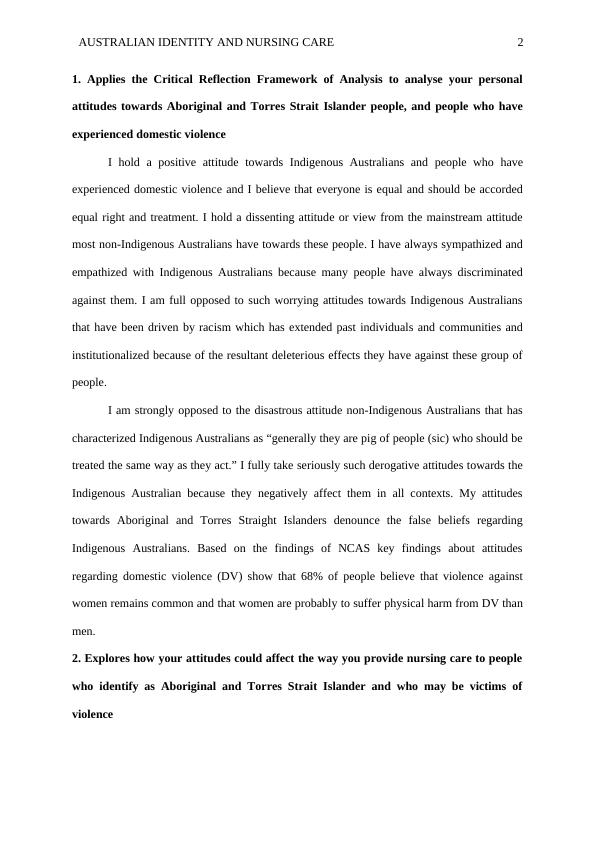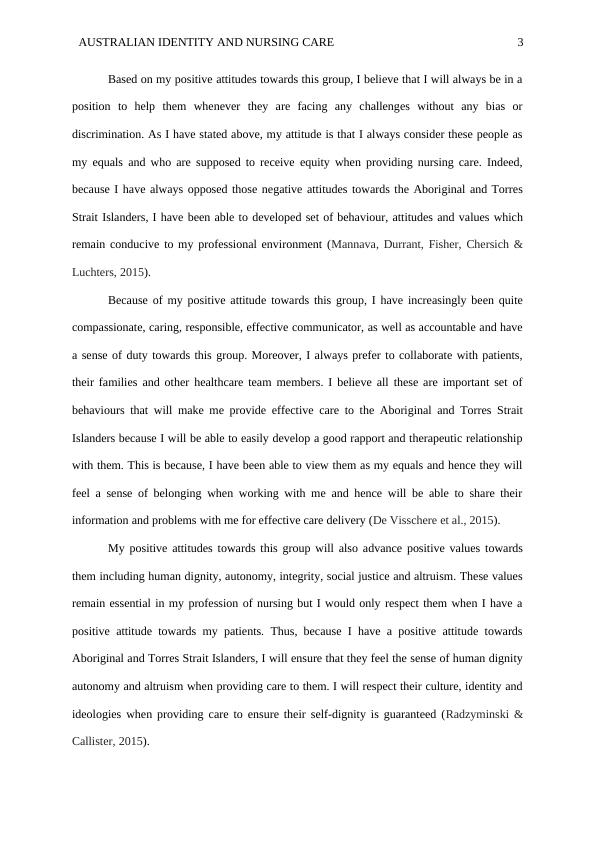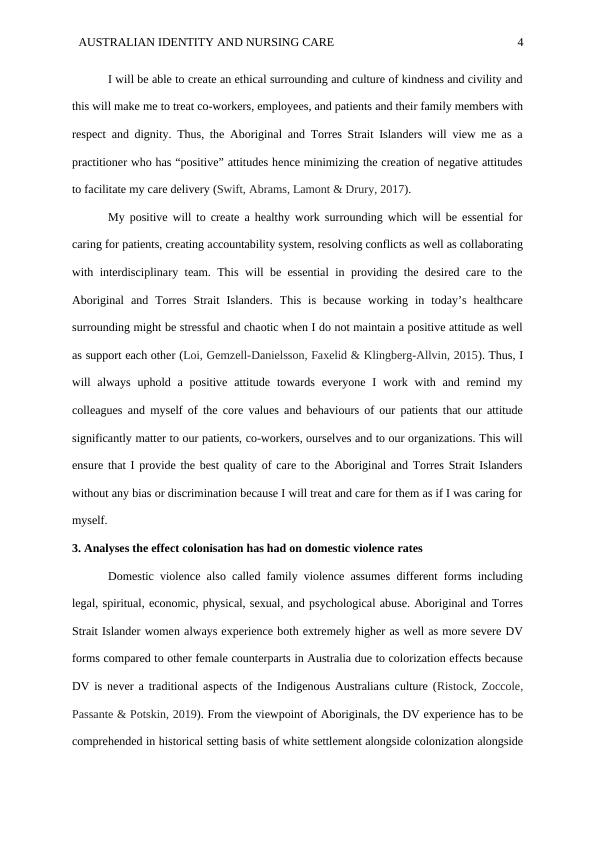Australian Identity and Nursing Care | Question and Answer
Added on 2022-09-14
13 Pages3844 Words15 Views
Running head: AUSTRALIAN IDENTITY AND NURSING CARE 1
Australian Identity and Nursing Care
Name
Institutional Affiliation
Australian Identity and Nursing Care
Name
Institutional Affiliation

AUSTRALIAN IDENTITY AND NURSING CARE 2
1. Applies the Critical Reflection Framework of Analysis to analyse your personal
attitudes towards Aboriginal and Torres Strait Islander people, and people who have
experienced domestic violence
I hold a positive attitude towards Indigenous Australians and people who have
experienced domestic violence and I believe that everyone is equal and should be accorded
equal right and treatment. I hold a dissenting attitude or view from the mainstream attitude
most non-Indigenous Australians have towards these people. I have always sympathized and
empathized with Indigenous Australians because many people have always discriminated
against them. I am full opposed to such worrying attitudes towards Indigenous Australians
that have been driven by racism which has extended past individuals and communities and
institutionalized because of the resultant deleterious effects they have against these group of
people.
I am strongly opposed to the disastrous attitude non-Indigenous Australians that has
characterized Indigenous Australians as “generally they are pig of people (sic) who should be
treated the same way as they act.” I fully take seriously such derogative attitudes towards the
Indigenous Australian because they negatively affect them in all contexts. My attitudes
towards Aboriginal and Torres Straight Islanders denounce the false beliefs regarding
Indigenous Australians. Based on the findings of NCAS key findings about attitudes
regarding domestic violence (DV) show that 68% of people believe that violence against
women remains common and that women are probably to suffer physical harm from DV than
men.
2. Explores how your attitudes could affect the way you provide nursing care to people
who identify as Aboriginal and Torres Strait Islander and who may be victims of
violence
1. Applies the Critical Reflection Framework of Analysis to analyse your personal
attitudes towards Aboriginal and Torres Strait Islander people, and people who have
experienced domestic violence
I hold a positive attitude towards Indigenous Australians and people who have
experienced domestic violence and I believe that everyone is equal and should be accorded
equal right and treatment. I hold a dissenting attitude or view from the mainstream attitude
most non-Indigenous Australians have towards these people. I have always sympathized and
empathized with Indigenous Australians because many people have always discriminated
against them. I am full opposed to such worrying attitudes towards Indigenous Australians
that have been driven by racism which has extended past individuals and communities and
institutionalized because of the resultant deleterious effects they have against these group of
people.
I am strongly opposed to the disastrous attitude non-Indigenous Australians that has
characterized Indigenous Australians as “generally they are pig of people (sic) who should be
treated the same way as they act.” I fully take seriously such derogative attitudes towards the
Indigenous Australian because they negatively affect them in all contexts. My attitudes
towards Aboriginal and Torres Straight Islanders denounce the false beliefs regarding
Indigenous Australians. Based on the findings of NCAS key findings about attitudes
regarding domestic violence (DV) show that 68% of people believe that violence against
women remains common and that women are probably to suffer physical harm from DV than
men.
2. Explores how your attitudes could affect the way you provide nursing care to people
who identify as Aboriginal and Torres Strait Islander and who may be victims of
violence

AUSTRALIAN IDENTITY AND NURSING CARE 3
Based on my positive attitudes towards this group, I believe that I will always be in a
position to help them whenever they are facing any challenges without any bias or
discrimination. As I have stated above, my attitude is that I always consider these people as
my equals and who are supposed to receive equity when providing nursing care. Indeed,
because I have always opposed those negative attitudes towards the Aboriginal and Torres
Strait Islanders, I have been able to developed set of behaviour, attitudes and values which
remain conducive to my professional environment (Mannava, Durrant, Fisher, Chersich &
Luchters, 2015).
Because of my positive attitude towards this group, I have increasingly been quite
compassionate, caring, responsible, effective communicator, as well as accountable and have
a sense of duty towards this group. Moreover, I always prefer to collaborate with patients,
their families and other healthcare team members. I believe all these are important set of
behaviours that will make me provide effective care to the Aboriginal and Torres Strait
Islanders because I will be able to easily develop a good rapport and therapeutic relationship
with them. This is because, I have been able to view them as my equals and hence they will
feel a sense of belonging when working with me and hence will be able to share their
information and problems with me for effective care delivery (De Visschere et al., 2015).
My positive attitudes towards this group will also advance positive values towards
them including human dignity, autonomy, integrity, social justice and altruism. These values
remain essential in my profession of nursing but I would only respect them when I have a
positive attitude towards my patients. Thus, because I have a positive attitude towards
Aboriginal and Torres Strait Islanders, I will ensure that they feel the sense of human dignity
autonomy and altruism when providing care to them. I will respect their culture, identity and
ideologies when providing care to ensure their self-dignity is guaranteed (Radzyminski &
Callister, 2015).
Based on my positive attitudes towards this group, I believe that I will always be in a
position to help them whenever they are facing any challenges without any bias or
discrimination. As I have stated above, my attitude is that I always consider these people as
my equals and who are supposed to receive equity when providing nursing care. Indeed,
because I have always opposed those negative attitudes towards the Aboriginal and Torres
Strait Islanders, I have been able to developed set of behaviour, attitudes and values which
remain conducive to my professional environment (Mannava, Durrant, Fisher, Chersich &
Luchters, 2015).
Because of my positive attitude towards this group, I have increasingly been quite
compassionate, caring, responsible, effective communicator, as well as accountable and have
a sense of duty towards this group. Moreover, I always prefer to collaborate with patients,
their families and other healthcare team members. I believe all these are important set of
behaviours that will make me provide effective care to the Aboriginal and Torres Strait
Islanders because I will be able to easily develop a good rapport and therapeutic relationship
with them. This is because, I have been able to view them as my equals and hence they will
feel a sense of belonging when working with me and hence will be able to share their
information and problems with me for effective care delivery (De Visschere et al., 2015).
My positive attitudes towards this group will also advance positive values towards
them including human dignity, autonomy, integrity, social justice and altruism. These values
remain essential in my profession of nursing but I would only respect them when I have a
positive attitude towards my patients. Thus, because I have a positive attitude towards
Aboriginal and Torres Strait Islanders, I will ensure that they feel the sense of human dignity
autonomy and altruism when providing care to them. I will respect their culture, identity and
ideologies when providing care to ensure their self-dignity is guaranteed (Radzyminski &
Callister, 2015).

AUSTRALIAN IDENTITY AND NURSING CARE 4
I will be able to create an ethical surrounding and culture of kindness and civility and
this will make me to treat co-workers, employees, and patients and their family members with
respect and dignity. Thus, the Aboriginal and Torres Strait Islanders will view me as a
practitioner who has “positive” attitudes hence minimizing the creation of negative attitudes
to facilitate my care delivery (Swift, Abrams, Lamont & Drury, 2017).
My positive will to create a healthy work surrounding which will be essential for
caring for patients, creating accountability system, resolving conflicts as well as collaborating
with interdisciplinary team. This will be essential in providing the desired care to the
Aboriginal and Torres Strait Islanders. This is because working in today’s healthcare
surrounding might be stressful and chaotic when I do not maintain a positive attitude as well
as support each other (Loi, Gemzell-Danielsson, Faxelid & Klingberg-Allvin, 2015). Thus, I
will always uphold a positive attitude towards everyone I work with and remind my
colleagues and myself of the core values and behaviours of our patients that our attitude
significantly matter to our patients, co-workers, ourselves and to our organizations. This will
ensure that I provide the best quality of care to the Aboriginal and Torres Strait Islanders
without any bias or discrimination because I will treat and care for them as if I was caring for
myself.
3. Analyses the effect colonisation has had on domestic violence rates
Domestic violence also called family violence assumes different forms including
legal, spiritual, economic, physical, sexual, and psychological abuse. Aboriginal and Torres
Strait Islander women always experience both extremely higher as well as more severe DV
forms compared to other female counterparts in Australia due to colorization effects because
DV is never a traditional aspects of the Indigenous Australians culture (Ristock, Zoccole,
Passante & Potskin, 2019). From the viewpoint of Aboriginals, the DV experience has to be
comprehended in historical setting basis of white settlement alongside colonization alongside
I will be able to create an ethical surrounding and culture of kindness and civility and
this will make me to treat co-workers, employees, and patients and their family members with
respect and dignity. Thus, the Aboriginal and Torres Strait Islanders will view me as a
practitioner who has “positive” attitudes hence minimizing the creation of negative attitudes
to facilitate my care delivery (Swift, Abrams, Lamont & Drury, 2017).
My positive will to create a healthy work surrounding which will be essential for
caring for patients, creating accountability system, resolving conflicts as well as collaborating
with interdisciplinary team. This will be essential in providing the desired care to the
Aboriginal and Torres Strait Islanders. This is because working in today’s healthcare
surrounding might be stressful and chaotic when I do not maintain a positive attitude as well
as support each other (Loi, Gemzell-Danielsson, Faxelid & Klingberg-Allvin, 2015). Thus, I
will always uphold a positive attitude towards everyone I work with and remind my
colleagues and myself of the core values and behaviours of our patients that our attitude
significantly matter to our patients, co-workers, ourselves and to our organizations. This will
ensure that I provide the best quality of care to the Aboriginal and Torres Strait Islanders
without any bias or discrimination because I will treat and care for them as if I was caring for
myself.
3. Analyses the effect colonisation has had on domestic violence rates
Domestic violence also called family violence assumes different forms including
legal, spiritual, economic, physical, sexual, and psychological abuse. Aboriginal and Torres
Strait Islander women always experience both extremely higher as well as more severe DV
forms compared to other female counterparts in Australia due to colorization effects because
DV is never a traditional aspects of the Indigenous Australians culture (Ristock, Zoccole,
Passante & Potskin, 2019). From the viewpoint of Aboriginals, the DV experience has to be
comprehended in historical setting basis of white settlement alongside colonization alongside

End of preview
Want to access all the pages? Upload your documents or become a member.
Related Documents
Cultural safety Cultural safety Steplg...
|4
|589
|16
Contemporary Indigenous Health and Wellbeinglg...
|8
|2052
|465
Cultural Safety in Healthcarelg...
|8
|2356
|201
Equity or Equality for Aboriginals Healthcarelg...
|5
|1027
|17
Culturally Safe Practice for Aboriginal and Torres Strait Islander Populationlg...
|13
|3474
|95
Violence among Indigenous Women in Australialg...
|14
|3838
|66
